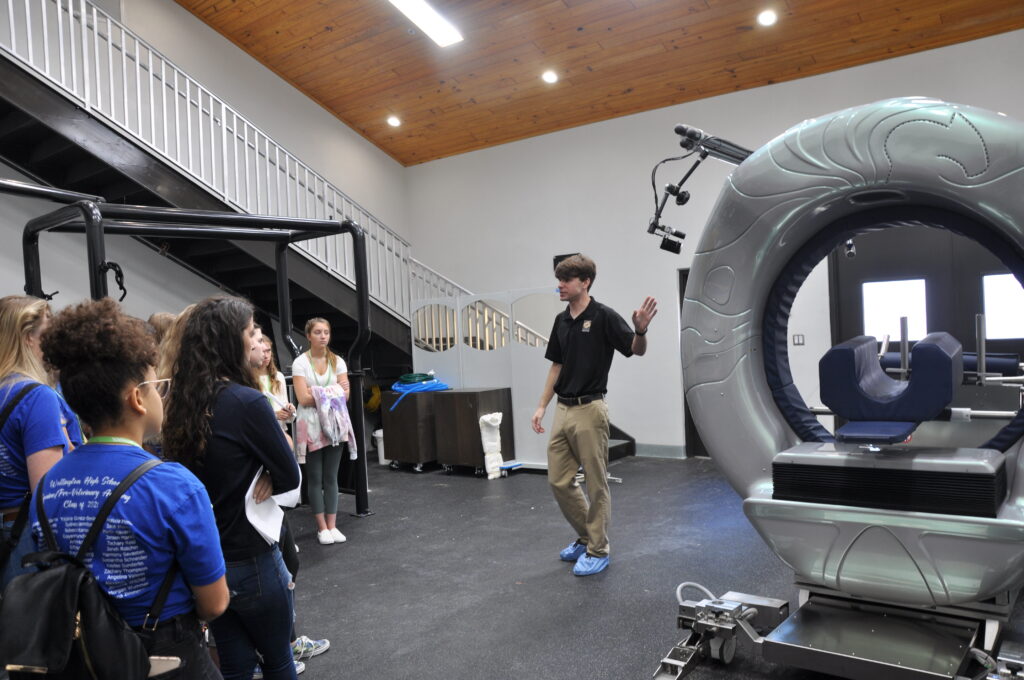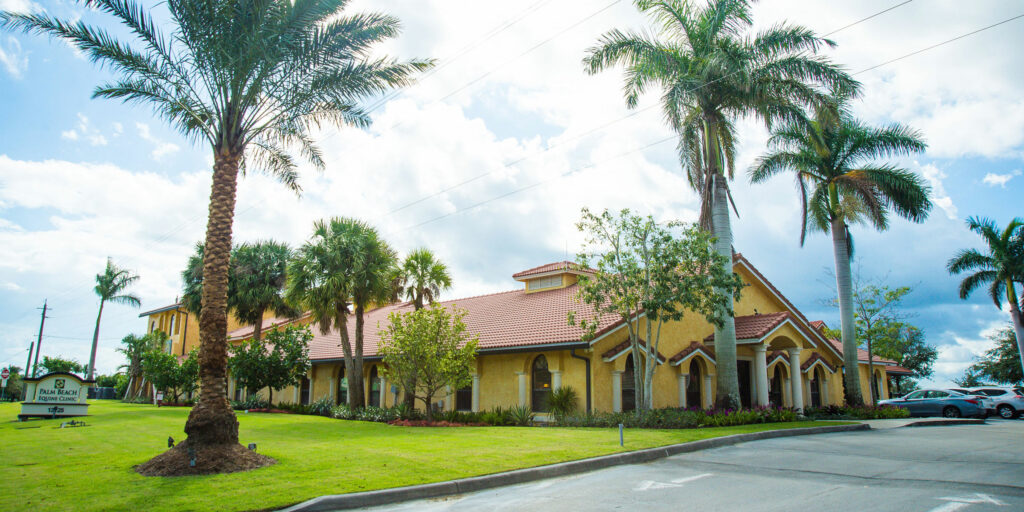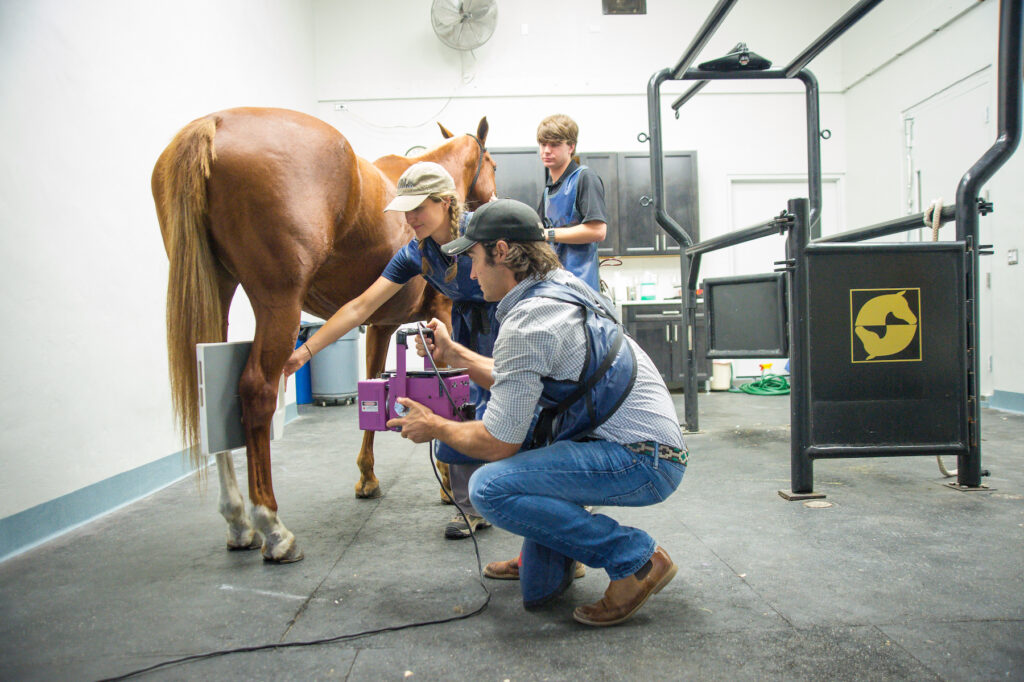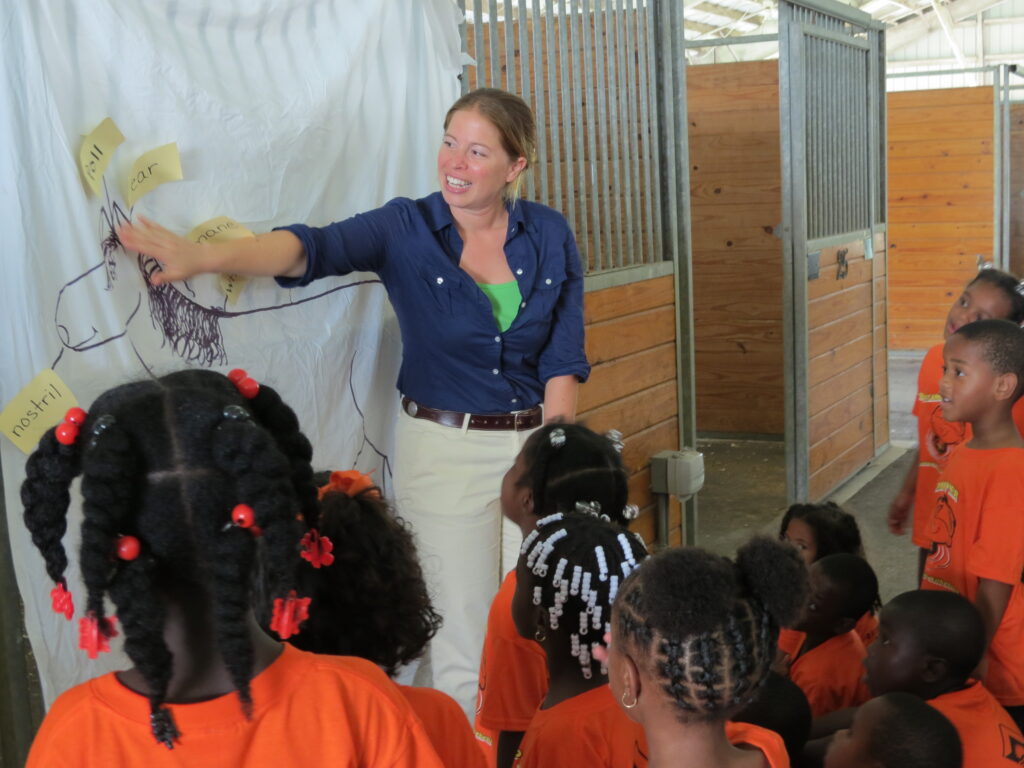Category: Community
By Alice Collins / Jump Media
Wellington, FL – Miss Miami is one of Miami’s longest-serving and most-valued police horses, having joined the team 21 years ago and been through six police chiefs. In the early spring of 2024 at the age of 26, Miami Police Department (PD) had begun to wind down her workload and prepare her for retirement. However, on April 10 Miss Miami looked uncomfortable, and officers called their veterinarian.
“She was not feeling good, and it looked like colic,” explained Lieutenant Redondo of Miami PD. “The vet came and saw she was in distress and said we’d probably have to do surgery. They couldn’t do it and referred us to Palm Beach Equine Clinic [PBEC].”
Miss Miami was driven straight to PBEC in Wellington, FL, where the team carried out a physical exam, blood work, nasogastric intubation, an ultrasound, abdominocentesis, and a rectal exam. Their findings were consistent with a surgical lesion, and she was diagnosed with a strangulating lipoma, a small, benign, fatty tumor that develops within the abdomen and occasionally develops a long, string-like stalk. The lipoma and stalk can wrap around a part of the horse’s digestive system, cutting off the blood supply and resulting in death of that section of intestine.

On the day she arrived at PBEC, Miss Miami was taken to emergency surgery after an initial evaluation and operated on by Dr. Weston Davis DVM, DACVS, who ended up performing a resection and anastomosis, which is where a part of intestine is removed and the two ends are rejoined.
“Miss Miami was routinely induced under general anesthesia; the abdomen was clipped and aseptically prepared for surgery,” explained Davis, who is a native of South Florida and whose father was also a veterinarian. “A midline incision was created, and exploration revealed a large segment of mid-jejunum [the middle part of the small intestine] that appeared to have been strangulated by the stalk of a strangulating lipoma.”
The portion of the small intestine affected was no longer viable, so Davis removed the two-foot long segment of jejunum. Miss Miami’s abdominal incision was then closed with absorbable sutures in the deeper layers and stainless-steel staples in the skin.
Miss Miami was given intravenous fluid therapy including pain relief, electrolytes, anti-inflammatories, antibiotics, and gastroprotectants. She recovered from the anesthesia without incident, and a large abdominal support bandage was applied in recovery.

She was not yet out of the woods, however. Miss Miami’s forelimb digital pulses were mildly elevated in the first 36 hours after the operation. She was managed with digital cryotherapy, and frog supports were applied to both front feet. Her appetite was also diminished following surgery, and she was fed via nasogastric intubation until her appetite began to increase. At that point, her rations were given normally, and the quantity was gradually increased. Her digital pulses returned to normal.
After a week at PBEC, Miss Miami was bright, with a good appetite, passing normal manure, and walking comfortably. She was ready to be released back into the care of Miami PD. Their local veterinarian oversaw the removal of Miss Miami’s stitches a week later, and her belly bandage was reapplied. The Miami PD team was also given four daily exercises by PBEC for Miss Miami to start at home two weeks after surgery to help support her recovery: barrel lifts, butt tucks, stepping backwards, and walking over poles.

“She would have died without the surgery,” stated Redondo. “She has recovered really well. She is still here with us in Miami, but we have started the paperwork to retire her to farmland up in North Florida. Everybody around here knows her and loves her; she’s one of our most famous horses. She’s been here longer than I have, and she’s one of the horses that we liked to use on the regular. Having a horse that already knows the job and is used to all the traffic and loud noises makes it easy, so we are going to miss her.
“The fact that the department agreed to take care of a horse who is old or not being ridden anymore says a lot, and the fact that PBEC took care of her was so great,” he concluded.

PBEC’s kindness and swift action ensured that Miss Miami will now be able to enjoy the retirement she deserves after her years of loyal service. If you or your veterinarian would like to learn more about Palm Beach Equine Clinic and how it can help your horse, call 561-793-1599 or visit www.EquineClinic.com.
The veterinarians of Palm Beach Equine Clinic have always enjoyed contributing to support the local community in Wellington, FL. As a leader in equine veterinary medicine, Palm Beach Equine Clinic makes it a priority to share knowledge and guide aspiring youth. Currently, through Wellington High School’s (WHS) Equine Pre-Vet Program, Palm Beach Equine Clinic has a hands-on program for students to introduce them to a career as promising young veterinary professionals.
Kickstart a Career in Veterinary Medicine
The Equine Pre-Vet Program at WHS provides students with an opportunity to pursue a rigorous, accelerated science program to prepare them for veterinary medicine and/or animal sciences at the college level. Equine Pre-Vet students are required to complete 20 hours of community service in an animal-based area during each year of high school. As a senior in high school, students are also required to intern with an animal healthcare facility, complete research assignments on veterinary medicine, and prepare veterinary case studies.

WHS seniors who choose to pursue the Equine Pre-Vet Program have a wealth of knowledge at their fingertips with one of the world’s most advanced equine medical centers just down the road. Palm Beach Equine Clinic is home to more than 30 world-class veterinarians who all know the process of becoming a top veterinarian within the industry.
Learning from a diverse team of veterinarians
Through the program at WHS and the generosity of the veterinarians at Palm Beach Equine Clinic, students in the Equine Pre-Vet Program have the unique opportunity to learn all about the profession from the very best. Seniors in the program are given the chance to shadow veterinarians as they work at the clinic, as well as out on ambulatory calls at the farms. The program requires that each student obtain a certain number of externship hours, but Palm Beach Equine Clinic allows the students to help and observe for as many hours as desired. Many students show a high level of interest and become highly involved at the clinic. Palm Beach Equine Clinic tries to accommodate each student for their participation at every level.
A program is also offered for junior students at WHS who are considering joining the Equine Pre-Vet Program when they become seniors. Junior students are invited to the clinic to learn about various paths in veterinary medicine and tour the facility in small groups. Palm Beach Equine Clinic sets up multiple stations for them to learn about things including blood work, physical exams, reproduction, and business management.

Palm Beach Equine Clinic’s Dr. Janet Greenfield-Davis is very involved with the program and enjoys teaching students of all ages. She has been involved in the local school system’s career day for younger children at the elementary level and also mentors the senior students who have already chosen the veterinary path involved in the externship program.
“We try to play an active role in our community, and we really enjoy having the kids visit the clinic,” said Dr. Greenfield-Davis. “When I went to high school, it was just general education, but now they really specialize in gearing the children towards specific programs in high school, and I think that is pretty impressive. To have PBEC right around the corner is handy for them, and it is nice for us to have the kids come through.
“We have some students that will come in on their own outside of school and ask to volunteer,” continued Greenfield-Davis. “We also have two girls that are in vet school now that started here in high school. They went to local colleges and they continued to come to our practice and participate all through college. We were able to write them recommendations for veterinary school, and they both got in, so we are super proud of them. We try to do all we can for the high school. We are really happy that we can provide those opportunities for the students and see them excel.”
Equine Internships and Externships for Veterinary Students and Graduates

While Palm Beach Equine Clinic may be known for the 28 superb veterinarians who call it home, they are also a driving force in educating the next generation of equine medical professionals. Through world-renowned equine internship and externship programs, Palm Beach Equine Clinic molds new veterinarians every day.
Each year, equine interns work with Palm Beach Equine Clinic veterinarians for a 12-month period. Whether from externships that usually last up to two weeks and serve as an introduction to the practice or by references from top veterinarians across the U.S. and abroad, Palm Beach Equine Clinic attracts the most promising young veterinarians in the field.
Educating Equine Veterinary Students and Graduates From Around the World
Currently, Palm Beach Equine Clinic is host to recently graduated veterinary students from Oklahoma, Scotland, and Argentina. According to Palm Beach Equine Clinic veterinarian and board-certified surgeon Dr. Weston Davis who leads the Internship program, South Florida attracts only the best.
“We really have the cream of the crop because they have big opportunities here,” said Dr. Davis. “A lot of equine internships can offer work with one or two veterinarians, but what’s cool at Palm Beach Equine Clinic is they can pick from the collection of doctors we have.”
Palm Beach Equine Clinic interns rotate through three phases, including hands-on application of hospital anesthetization, imaging – both from ambulatory duty and elective – and working with a doctor of their choice based on their specific interests.

Dr. Davis has been with Palm Beach Equine Clinic for two years and immediately took interest in making the equine internship program the best it could be. In two years, he has made one of the world’s best programs even better.
Benefits of an Equine Internship

“I wanted to make it as organized and structured as it could be so they can get as much out of that year as possible,” he said. “The general rule is that doing a one-year equine internship puts you three to five years ahead of those that come out of school and start out on their own. Interns come out of school with a handle on book knowledge and the internships give them a good clinical appreciation for those same topics. They see a lot and do a lot under the supervision of seasoned veterinarians while they are here.”
While Palm Beach Equine internships offer obvious perks for the interns themselves, it also has added benefit for the veterinarians already at the clinic.
“The value for the interns is they get to see a tremendous amount of cases in short time, but it’s also valuable for us because they come out of school with fresh knowledge, new ideas, and keep us current and on our toes,” said Dr. Davis.
Traditionally veterinary students will fulfill their equine internship requirements and move on to find a full-time position at other practices. Dr. Davis himself did just that after graduating from the University of Florida College Of Veterinary Medicine and interning at Oakridge Equine Hospital in Oklahoma. But, the experiences available at Palm Beach Equine Clinic keep its interns staying put.
Equine Internships Kickstart Veterinary Careers
History has proven that many interns who work for Palm Beach Equine Clinic as interns go on to accept full-time positions at the clinic. One of those veterinarians is Dr. Ryan Lukens. After earning his DVM from The Ohio State University College of Veterinary Medicine, he began an internship with Palm Beach Equine Clinic in 2012.
“I am so pleased that I did my internship with Palm Beach Equine,” said Dr. Lukens. “It was basically another year of school where I got to focus on exactly what I wanted to do.”
Dr. Lukens specialized in sports medicine, lameness, and diagnostic imaging, which is a passion he inherited from his father, a fellow veterinarian. His experience with Palm Beach Equine Clinic solidified that concentration thanks to the latest in veterinary technology.
“When I came to Palm Beach Equine Clinic, I had access to all the newest equipment. That gave me more tools to improve my skills under the direction of a full network of senior veterinarians,” added Dr. Lukens. “When you leave vet school, you have a question every hour of the day, and I had a number of veterinarians who were a phone call away to answer those questions. I never had to second-guess myself because they were there to help me learn. But, there also isn’t always one way to do something correctly. I learned the opinions of so many veterinarians who do things just a little differently, and it helped me to find my own way and what’s best for the horses I treat.”

Thanks to Palm Beach Equine Clinic, horse owners in South Florida and beyond have access to well-educated veterinarians with hands-on experience that is unmatched.
Interested in Applying for an Equine Internship?
Fill out this form to get in contact with the internship and externship department.
Dr. Scott Swerdlin, President of Palm Beach Equine Clinic was asked to judge trainer, Charlie Moorcroft’s annual Halloween Pony Parade and Costume Contest on Sunday afternoon, October 27th. Each contest won a prize for various categories. The final prize given was two $50 gift certificates to Palm Beach Equine Clinic for the Best of Show awards. The winners were Sophie Studd and Eliza Guero. Congratulations kids and have a Happy Halloween!!!
On May 10, 2013, Dr. Janet Greenfield-Davis participated in career day at Elbridge Elementary School. Elbridge Elementary is one of many schools that Dr. Greenfield-Davis has donated her time and knowledge to educate our young students of today on equine veterinary medicine. Dr. Greenfield-Davis is the official veterinarian for Vinceremos Therapeutic Riding Center, which focuses on equine-related programs for special needs children. Dr. Greenfield-Davis enjoys educating the community while raising awareness of equine health.

“Educating our community and public service is a culture that we emphasize at Palm Beach Equine Clinic”, stated Dr. Scott Swerdlin, President of Palm Beach Equine Clinic.
Dr. Ryan Lukens recently completed an internship at Palm Beach Equine Clinic. Dr. Lukens excelled during his internship and was presented a contract toward a long and successful future with Palm Beach Equine Clinic. In the spirit of our mission statement, Dr. Lukens presented a lecture to 200 first graders concerning the anatomy of the horse with the Horse Tales Literacy Program. This event occurred at Good Earth Farm in Loxahatchee on Friday, May 17th.

“Dr Lukens was wonderful. He was knowledgeable and very patient with the first graders”, said Shelley LaConte, South Florida Director of the Horse Tales Literacy Project. “He had a smile on his face the whole day. It was a pleasure working with him. We were very grateful for his time and glad he is a part of Palm Beach Equine Clinic.” If you or any of your organizations would like a lecture or presenter please call Eques Solutions at 561-227- 1537.